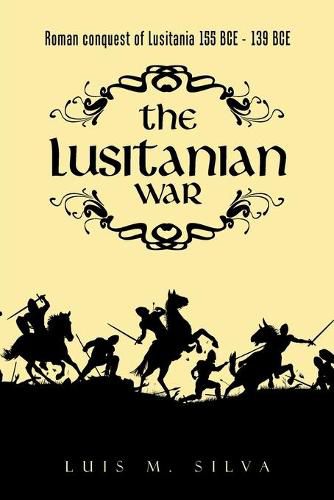Readings Newsletter
Become a Readings Member to make your shopping experience even easier.
Sign in or sign up for free!
You’re not far away from qualifying for FREE standard shipping within Australia
You’ve qualified for FREE standard shipping within Australia
The cart is loading…






This title is printed to order. This book may have been self-published. If so, we cannot guarantee the quality of the content. In the main most books will have gone through the editing process however some may not. We therefore suggest that you be aware of this before ordering this book. If in doubt check either the author or publisher’s details as we are unable to accept any returns unless they are faulty. Please contact us if you have any questions.
Following the Second Punic War in 202 B.C. when the Carthaginians were finally ousted from Iberia, Rome thought that they were now in control of the region. Soon, however, they found themselves pitted against an unexpected foe: the native Iberio-Celts, the Lusitanians. With one occupier gone, the Lusitanians took the opportunity to oppose their replacement, the Romans, in an effort to establish their own nation. Led by the charismatic Viriathus, whose example instilled the same kind of fury and devotion as the future Celtic warrior queen Boudica, the Lusitanians began a bitter war with the Romans in 155 B.C. that would rage on and off for the next twenty-five years. Despite their military advantage, the Romans could not at first defeat the Lusitanians, so they offered a peace treaty. A large number of Lusitanians and their key leaders arrived at the designated meeting point, only to be massacred. Viriathus managed to escape the deadly trap and rallied his people to continue the fight. Knowing that they did not have the numbers of trained soldiers to oppose the Roman Army, Viriathus developed a guerrilla campaign of hit-and-run tactics and attrition. After years of stalemate, the Romans once again sued for peace. Following a short truce, however, the war resumed but the Romans still could not subdue the Lusitanians. Finally, they resorted to paying assassins to do what their army could not: kill Viriathus. With his death, the Lusitanian resistance collapsed and Rome secured Iberia as a province of the empire. Based on classical sources and Portuguese and Spanish language archival material, The Lusitanian War: Viriathus the Iberian Against Rome is the first booklength study of this fascinating leader and the important campaign he waged. His style of warfare had a profound influence on future Roman Army tactics when fighting native troops.
$9.00 standard shipping within Australia
FREE standard shipping within Australia for orders over $100.00
Express & International shipping calculated at checkout
This title is printed to order. This book may have been self-published. If so, we cannot guarantee the quality of the content. In the main most books will have gone through the editing process however some may not. We therefore suggest that you be aware of this before ordering this book. If in doubt check either the author or publisher’s details as we are unable to accept any returns unless they are faulty. Please contact us if you have any questions.
Following the Second Punic War in 202 B.C. when the Carthaginians were finally ousted from Iberia, Rome thought that they were now in control of the region. Soon, however, they found themselves pitted against an unexpected foe: the native Iberio-Celts, the Lusitanians. With one occupier gone, the Lusitanians took the opportunity to oppose their replacement, the Romans, in an effort to establish their own nation. Led by the charismatic Viriathus, whose example instilled the same kind of fury and devotion as the future Celtic warrior queen Boudica, the Lusitanians began a bitter war with the Romans in 155 B.C. that would rage on and off for the next twenty-five years. Despite their military advantage, the Romans could not at first defeat the Lusitanians, so they offered a peace treaty. A large number of Lusitanians and their key leaders arrived at the designated meeting point, only to be massacred. Viriathus managed to escape the deadly trap and rallied his people to continue the fight. Knowing that they did not have the numbers of trained soldiers to oppose the Roman Army, Viriathus developed a guerrilla campaign of hit-and-run tactics and attrition. After years of stalemate, the Romans once again sued for peace. Following a short truce, however, the war resumed but the Romans still could not subdue the Lusitanians. Finally, they resorted to paying assassins to do what their army could not: kill Viriathus. With his death, the Lusitanian resistance collapsed and Rome secured Iberia as a province of the empire. Based on classical sources and Portuguese and Spanish language archival material, The Lusitanian War: Viriathus the Iberian Against Rome is the first booklength study of this fascinating leader and the important campaign he waged. His style of warfare had a profound influence on future Roman Army tactics when fighting native troops.